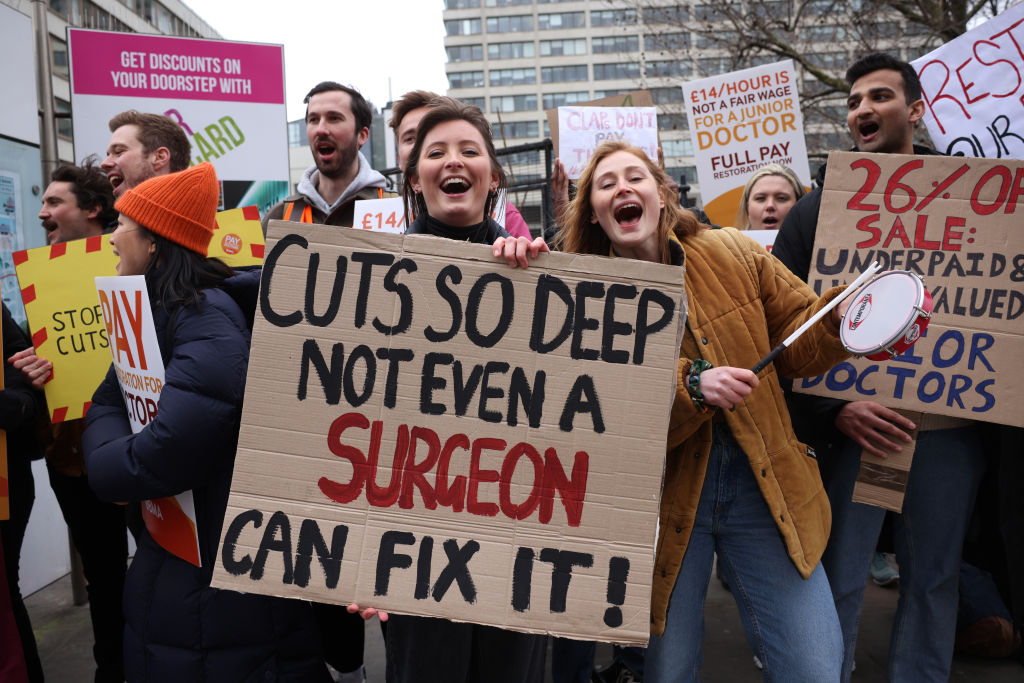I won’t be joining the consultants who are striking today. Though I fully support the legitimate concerns of my colleagues in the medical and other health professions taking part in industrial action across the NHS, I feel the toll this is taking on patients is unjustifiable.
This is not a decision I take lightly. When I was a junior doctor, I was very active in the original strikes that took place in 2016 opposing the new junior doctor contract. It is tempting to put this down to being young and naïve, but things were different back then: we were opposing the unilateral imposition of a new junior doctor contract rather than disputing an existing one; the healthcare system had not yet been crippled by the Covid pandemic; and the UK was in a much better position economically compared to the unemployment and financial struggles we are facing as a nation today.
Some cancer patients have had procedures cancelled multiple times due to the unrelenting nature of some of the strikes
This is not to say I don’t agree with the points made by consultants and junior doctors during the current industrial action. There is little doubt that hospital doctors in the NHS are under-valued compared to other developed countries. Prior to starting my consultant post, I was offered a very attractive position in New Zealand where the salary and quality of life was significantly better. Many of my colleagues have left the NHS to take up lucrative senior positions in Australia and the USA, and it is not difficult to see why.
For me the decision to stay is mainly one of duty. The NHS has always been good to me. It saved my life as a child and I have enjoyed every moment of working in the health service, from medical school to my senior position today. The idea that everyone in the UK is entitled to receive the best quality care available regardless of their financial means is something that should be protected and cherished.
But the noble characteristics that have come to define the NHS are being tested to the extreme by the current strikes. So far around 800,000 appointments, medical tests and procedures have been postponed as a result of the numerous industrial actions. Many of these are for chronic or benign conditions which carry a significant physical and psychological burden. Others are for more serious conditions such as cancer or cardiovascular disease where outcomes from treatment are time-dependent. Some cancer patients have had procedures cancelled multiple times due to the unrelenting nature of some of the strikes. Whilst there is no published data yet to show whether the strikes have affected cancer outcomes, numerous studies in the literature show that delays in treatment by even a short period can significantly reduce survival from cancer. Though the British Medical Association (BMA) have said they have given hospital trusts enough time to prepare for cancellations so they can reschedule operations, many trusts with limited resources and capacity will find this difficult to achieve in recommended cancer-treatment timeframes.
Both sides (the government and the trade unions) must share the blame for this current predicament. The government, for its part, must listen to the legitimate concerns of healthcare professionals and propose a package that adequately reflects the hard work NHS staff make each day in caring for patients, many of whom were putting their own lives at risk on the frontline during the height of the pandemic. There must also come a point when the financial loss for the government from the strikes begins to outweigh any higher costs from raising salaries.
The British Medical Association in turn must be less militant in its approach to the negotiations. Calls for stratospheric increases in pay when the rest of the country is suffering one of the worst recessions in its recent history is not realistic. Scotland’s junior doctors have managed to secure a reasonable offer which the rest of the UK’s doctors can aim for. There have been accusations that the BMA’s reluctance to negotiate in England is politically driven against a Conservative government. I don’t think this is entirely fair. People forget that the BMA also ‘vigorously’ opposed the Labour government in the introduction of the NHS in 1948 as they believed it would negatively impact the ability of doctors to practice freely and to set their own rates. As a trade union, the BMA’s goal has always been the welfare and remuneration of doctors.
This continuing industrial action is unsustainable for patients. Both the government and trade unions taking part in pay disputes must force at least a temporary cessation of hostilities. They should also allow urgent elective procedures (such as cancer treatments) to be exempt on strike days – as is the case currently for emergency care. This is necessary not only to protect the short and long-term health of our patients, but also to preserve the reputation of our health service.






Comments